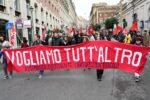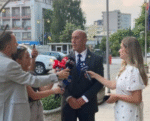The outgoing President of the European Council, Belgian politician Charles Michel, officially handed over the reins to his successor, Portuguese Prime Minister Antonio Costa. In a symbolic gesture, Michel passed the Council’s bell, which is used during sessions, signifying the transfer of power to Costa, who will now lead the 27 European Union leaders.
Michel spoke of the importance of unity within the EU, calling it the “silver bullet” of the Union, stating, “When united, we are powerful and influential, capable of achieving great things for our citizens. But this requires great effort, patience, and creativity.”
He expressed optimism about Europe’s future, highlighting the energy and dreams of its citizens, and emphasizing the importance of a self-assured, ambitious, and responsible Europe that takes charge of its economy, security, and prosperity.
Upon assuming office, Costa thanked Michel for his leadership and expressed that it was a great honor to lead the EU Council. He emphasized that his mission would be to continue building and preserving European unity. Costa also addressed the ongoing challenges facing the EU, noting the importance of cooperation among the 27 member states, which bring different histories, cultures, and perspectives.
In his inaugural speech, Costa also discussed the EU’s geopolitical challenges, stating that EU enlargement, particularly toward the Western Balkans, is a “geopolitical imperative.” He reaffirmed that the expansion of the EU to include countries like Serbia is a vital tool for peace, security, and progress.
“EU enlargement is essential for stability in our region. The EU and its candidates must work faster and more effectively, without setting artificial deadlines or facing endless obstacles,” said Costa.
Costa’s remarks also touched on the importance of tackling disagreements within the EU, emphasizing that Europe’s strength lies in its diversity, which should not be viewed as a problem but rather as a natural and powerful force.
Although Costa’s diplomatic abilities as a negotiator have earned him praise, his political career nearly came to an end in November 2022 following a corruption scandal in Portugal. He had resigned as Prime Minister after a high-profile corruption investigation that involved his chief of staff and several ministers. Despite these events, with no charges filed, Costa was able to continue his candidacy for the EU Council presidency, and the 27 leaders ultimately chose him as their new president.
Costa’s official term begins on December 1, 2024, marking the start of the new European Commission led by Ursula von der Leyen. It is expected that Costa will have a more productive working relationship with von der Leyen than Michel did, following speculations that their strained relationship had a negative impact on EU institutions.
In December, Costa will preside over the first meeting of the EU Council and a major EU-Western Balkans summit, which will include leaders from six countries in the region. Unofficial reports suggest that the meeting will include a working dinner with the regional leaders.







